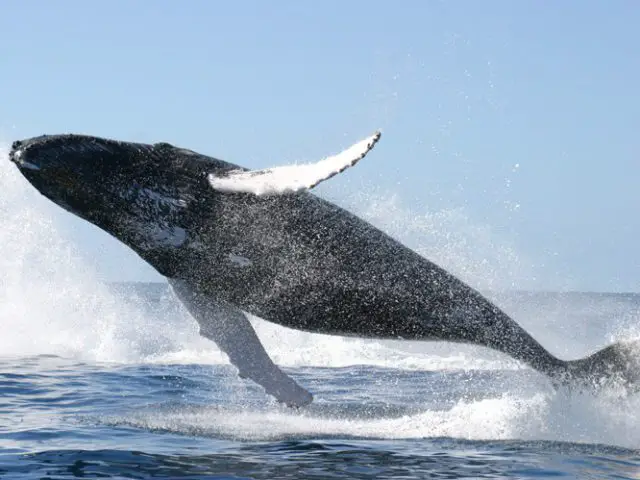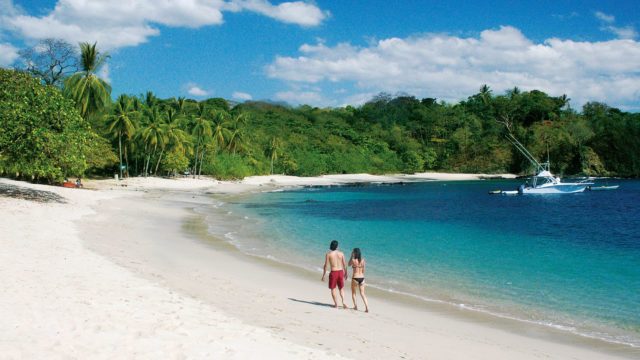The beautiful Marino Ballena National Park is one of the most unique places in our country. It is located along the Central Pacific coast in the south of Puntarenas. It consists of more than 13,000 protected hectares of ocean and 9 miles of coastline, consisting of mangrove forests, coral reefs, and pristine beaches, being one of the most sought-after locations by visitors who wish to escape the hustle and bustle of everyday life.
This park is named after the humpback whales that migrate to the region between August and November in a northerly direction from Antarctica and from December to April in a southerly direction from Alaska, every year. With the migration of whales almost all year round, it is a great place for whale watching.

The area was declared a national park in 1989 in order to protect the creatures that migrated here for breeding and feeding. Even the area is shaped like a whale tail if you look at it from the top. The Ballena Marine National Park spans 110 hectares of land and 5,375 hectares of sea. There are approximately 85 endemic species in the waters of this area.
The terrestrial limit runs by the line of official landmarks that demarcate the inalienable public zone, with the restricted areas of the terrestrial maritime zone and the edge of the adjacent wetlands and mangroves. The maritime limit is an imaginary line that encloses the cord of rocky reefs formed by the Tómbolo of Punta Uvita, Isla Ballena, Tres Hermanas and its surroundings, originating in Boca del Río Higuerón or Morete, ending in Punta Piñuelas.
The landscape of the Ballena Marine National Park varies depending on the tide. When the tide is low, travelers can walk to Punta Uvita, which makes up the tail of the whale. Rock formations appear approximately 1 kilometer from the shore. Being one of the most important and unusual formations of the earth, the whale tail of Punta Uvita is a must for travelers
What else can you find in this beautiful paradise?

Here we can find 4 beaches; they are Bahia Ballena Beach, Pinuela Beach, Colonia Beach, and Uvita Beach, with the main park ranger station located in Bahia Ballena Beach. These are quite deserted because of their protected status like national parks, so they are serene and perfect to explore. Because the waves here can be a little dangerous, they have formed small pools created by strong ocean currents that are perfect and safe for those who want to take a dip. Beaches of golden sand, rocky shores, and beautiful coral reefs are just some of the reasons why travelers and locals visit this area. There are also several islands where you can surf.
Our beautiful park is home to a wide variety of marine species of birds, including frigates, boobies, and brown pelicans. Bird watching is a popular activity here, and visitors can do it on board a boat or from the shore. However, many people visit this area for viewing impressive marine life with species such as humpback whales and Kemp’s ridleys. Other species that can be appreciated are bottlenose dolphins, sharks, starfish, killer whales, green iguanas, leatherback turtles, and more. Sea turtles nest on the shores of Bahia Ballena Beach, between May and November. Approximately 70 species of fish swim in the waters of the park. Being a marine national park under water, this reserve is simply intended to protect the lives of creatures in danger of extinction.
One of the most important marine environments in the area are the organic reefs, commonly called coral reefs. These are constituted by typical herma-corals, organisms that contribute most of the structure, also coral algae and some sponges, which help to unite the elements of the structure. The structure of the coral reef is porous, with 50% empty space. As the reef grows channels and cavities are formed that communicate with each other, a factor that allows the coexistence of a great variety of species in the reef.
Today many people visit this beautiful park, to enjoy everything it offers. People wishing to visit may arrive from San Jose driving or flying from Quepos National Airport. From the city of Quepos, the Costanera Sur highway is well paved and is about 67 kilometers away. Or you can simply take a pleasant scenic drive directly from San José, which will take approximately 3 hours.

